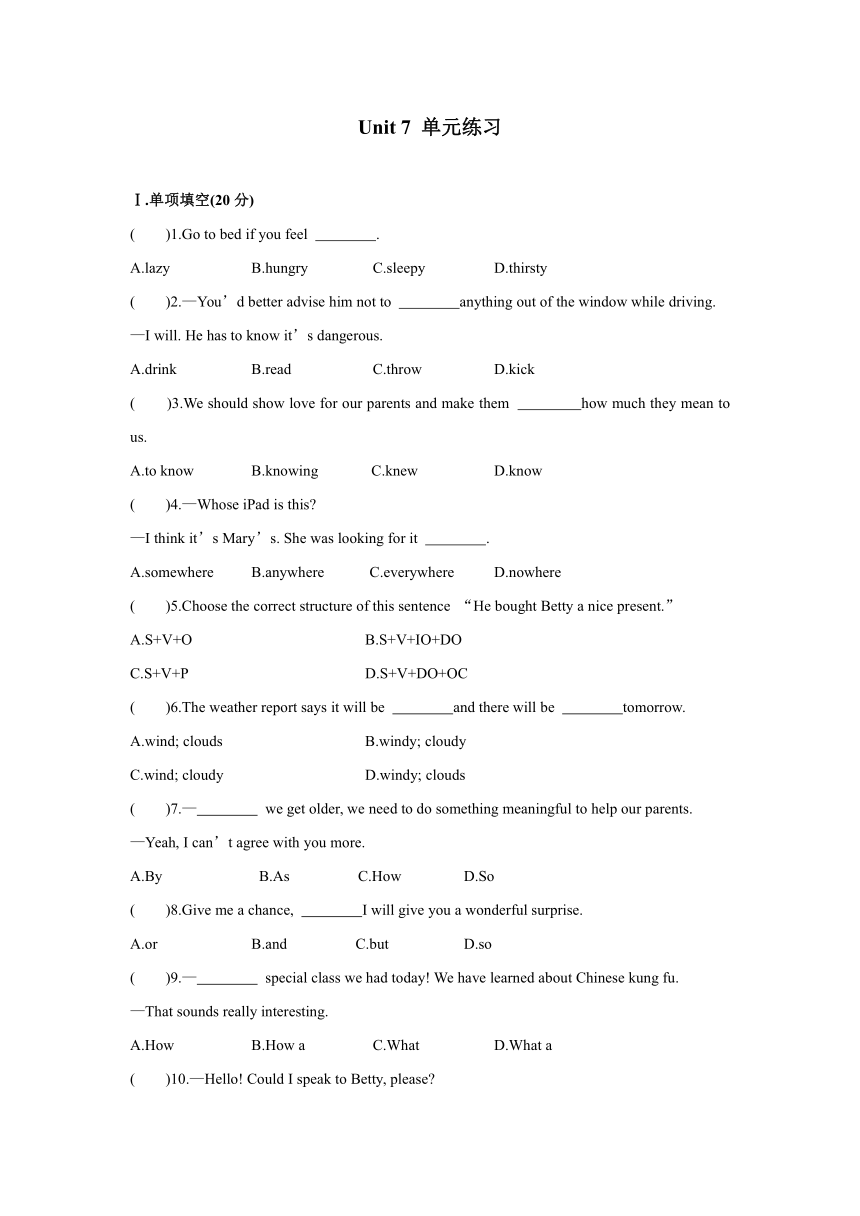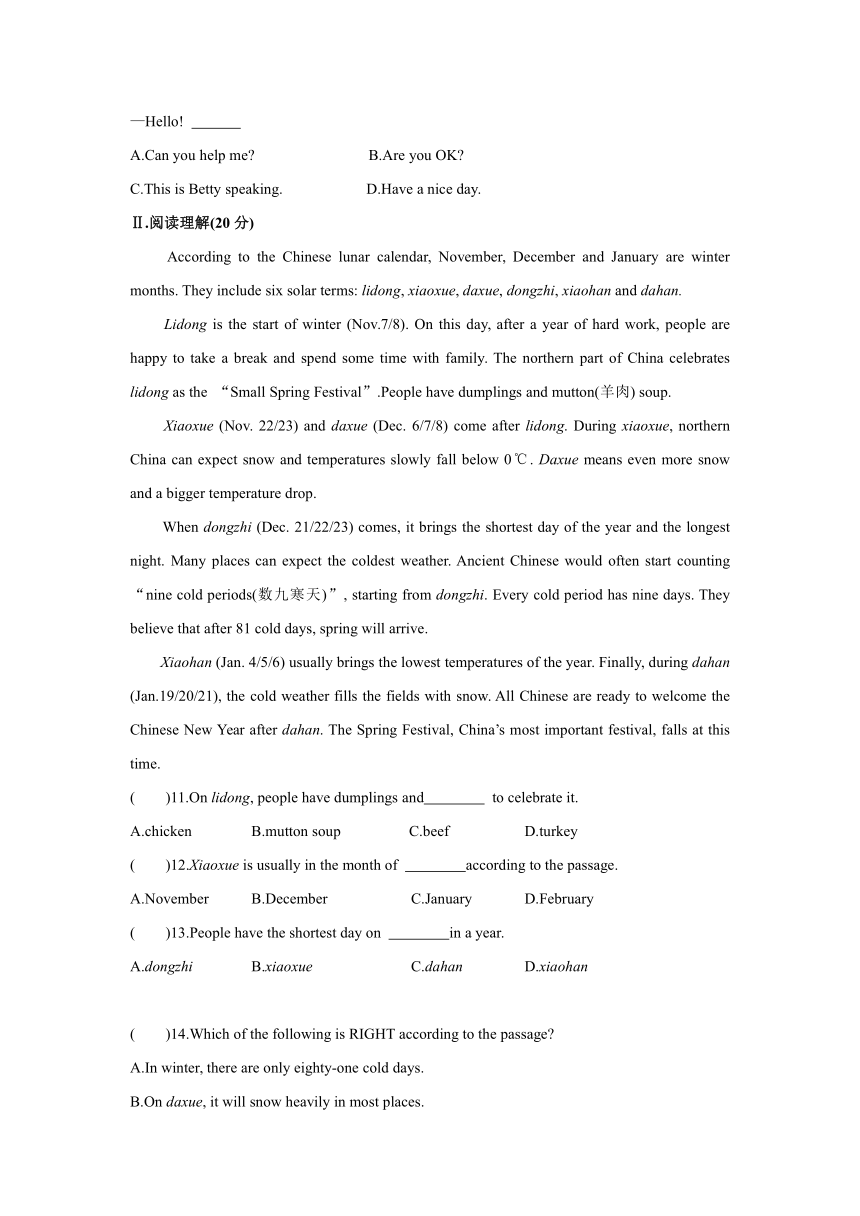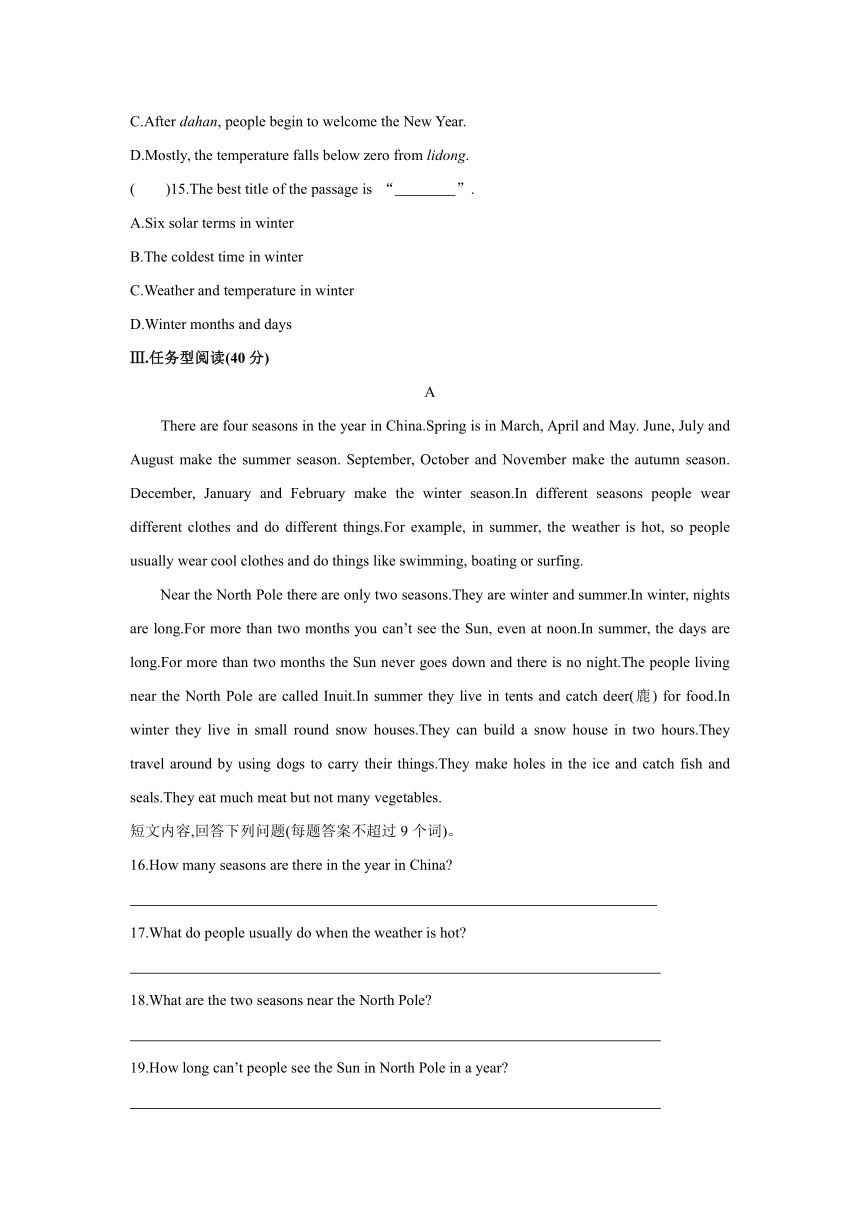牛津译林版英语八年级上册同步课时练习:Unit 7 单元练习(Word 含答案及解析)
文档属性
| 名称 | 牛津译林版英语八年级上册同步课时练习:Unit 7 单元练习(Word 含答案及解析) |  | |
| 格式 | docx | ||
| 文件大小 | 49.6KB | ||
| 资源类型 | 教案 | ||
| 版本资源 | 牛津译林版 | ||
| 科目 | 英语 | ||
| 更新时间 | 2022-06-21 11:25:58 | ||
图片预览



文档简介
Unit 7 单元练习
Ⅰ.单项填空(20分)
( )1.Go to bed if you feel .
A.lazy B.hungry C.sleepy D.thirsty
( )2.—You’d better advise him not to anything out of the window while driving.
—I will. He has to know it’s dangerous.
A.drink B.read C.throw D.kick
( )3.We should show love for our parents and make them how much they mean to us.
A.to know B.knowing C.knew D.know
( )4.—Whose iPad is this
—I think it’s Mary’s. She was looking for it .
A.somewhere B.anywhere C.everywhere D.nowhere
( )5.Choose the correct structure of this sentence “He bought Betty a nice present.”
A.S+V+O B.S+V+IO+DO
C.S+V+P D.S+V+DO+OC
( )6.The weather report says it will be and there will be tomorrow.
A.wind; clouds B.windy; cloudy
C.wind; cloudy D.windy; clouds
( )7.— we get older, we need to do something meaningful to help our parents.
—Yeah, I can’t agree with you more.
A.By B.As C.How D.So
( )8.Give me a chance, I will give you a wonderful surprise.
A.or B.and C.but D.so
( )9.— special class we had today! We have learned about Chinese kung fu.
—That sounds really interesting.
A.How B.How a C.What D.What a
( )10.—Hello! Could I speak to Betty, please
—Hello!
A.Can you help me B.Are you OK
C.This is Betty speaking. D.Have a nice day.
Ⅱ.阅读理解(20分)
According to the Chinese lunar calendar, November, December and January are winter months. They include six solar terms: lidong, xiaoxue, daxue, dongzhi, xiaohan and dahan.
Lidong is the start of winter (Nov.7/8). On this day, after a year of hard work, people are happy to take a break and spend some time with family. The northern part of China celebrates lidong as the “Small Spring Festival”.People have dumplings and mutton(羊肉) soup.
Xiaoxue (Nov. 22/23) and daxue (Dec. 6/7/8) come after lidong. During xiaoxue, northern China can expect snow and temperatures slowly fall below 0℃. Daxue means even more snow and a bigger temperature drop.
When dongzhi (Dec. 21/22/23) comes, it brings the shortest day of the year and the longest night. Many places can expect the coldest weather. Ancient Chinese would often start counting “nine cold periods(数九寒天)”, starting from dongzhi. Every cold period has nine days. They believe that after 81 cold days, spring will arrive.
Xiaohan (Jan. 4/5/6) usually brings the lowest temperatures of the year. Finally, during dahan (Jan.19/20/21), the cold weather fills the fields with snow. All Chinese are ready to welcome the Chinese New Year after dahan. The Spring Festival, China’s most important festival, falls at this time.
( )11.On lidong, people have dumplings and to celebrate it.
A.chicken B.mutton soup C.beef D.turkey
( )12.Xiaoxue is usually in the month of according to the passage.
A.November B.December C.January D.February
( )13.People have the shortest day on in a year.
A.dongzhi B.xiaoxue C.dahan D.xiaohan
( )14.Which of the following is RIGHT according to the passage
A.In winter, there are only eighty-one cold days.
B.On daxue, it will snow heavily in most places.
C.After dahan, people begin to welcome the New Year.
D.Mostly, the temperature falls below zero from lidong.
( )15.The best title of the passage is “ ”.
A.Six solar terms in winter
B.The coldest time in winter
C.Weather and temperature in winter
D.Winter months and days
Ⅲ.任务型阅读(40分)
A
There are four seasons in the year in China.Spring is in March, April and May. June, July and August make the summer season. September, October and November make the autumn season. December, January and February make the winter season.In different seasons people wear different clothes and do different things.For example, in summer, the weather is hot, so people usually wear cool clothes and do things like swimming, boating or surfing.
Near the North Pole there are only two seasons.They are winter and summer.In winter, nights are long.For more than two months you can’t see the Sun, even at noon.In summer, the days are long.For more than two months the Sun never goes down and there is no night.The people living near the North Pole are called Inuit.In summer they live in tents and catch deer(鹿) for food.In winter they live in small round snow houses.They can build a snow house in two hours.They travel around by using dogs to carry their things.They make holes in the ice and catch fish and seals.They eat much meat but not many vegetables.
短文内容,回答下列问题(每题答案不超过9个词)。
16.How many seasons are there in the year in China
17.What do people usually do when the weather is hot
18.What are the two seasons near the North Pole
19.How long can’t people see the Sun in North Pole in a year
20.Where do the people in the North Pole live in winter
B
阅读短文,从短文后的选项中选出能填入空白处的最佳选项。选项中有两项为多余选项。
Everything went black! All the lights in our flat turned off, including the TV. Mum took out the candles and Dad went to see what was going on. One advantage of living in a tall building is that you always have help nearby. 21. With a candle in his hand, Mr Smith answered the door. Uh-oh! He didn’t have lights, either. 22. Our neighbours went downstairs and began chatting outside. They were not worried at all.
Then we heard a frightening sound after a bright flash of lightning. 23. In order to get some information, Mr Smith turned on the radio. 24. It hit a tower at the power station before the first flash of lightning. That was the reason why the lights suddenly went out before the rain came. 25. We cheered loudly. The event made it possible for the neighbours to have a chance to be together.
A.It started to rain heavily in no time.
B.So I went to our next-door neighbour, Mr Smith.
C.At last all the lights turned off.
D.Finally, the lights came back.
E.I found that all the buildings caught fire.
F.The weatherman said that the storm was the cause of all the problems.
G.I found that all the buildings in our neighbourhood were dark.
Ⅳ.汉语提示完成句子(10分)
26.Now is (好时光)to visit Beijing.
27.The crow (飞很远) to look for food yesterday.
28. (天气是怎样变化) when autumn comes
29.I (发高烧) and I am feeling awful.
30.I (看见一些男孩在踢足球) when I looked out of the window.
Ⅴ.用括号中所给单词的正确形式填空(10分)
Venice is thought to be one of the most 31. (beauty) cities in the world. It has been known as the “City of Canals(运河)” “City of Bridges” and “City of Water”. The city is made up of about one hundred 32. (island), 150 canals, and 400 bridges. There 33.
(be) no roads in the city, so there are no cars. The only forms of transportation(交通) are on water and on 34. (foot). There are roads, a train station, and 35. (a) airport at the edge(边缘) of the city. One of the famous symbols of Venice is a “gondola(凤尾船)”. Gondolas are still used today, though 36. (main) by tourists. All Venetian gondolas are painted black—it was a law that was passed in the 37. (sixteen) century. Most Venetians travel by water buses called “vaporetti”. Venice has one of the world’s most famous bridges 38.
(call) the Rialto Bridge, built in 1591.
Venezuela, a country in South 39. (American), means “little Venice”. This is because the early European visitors to Venezuela first met the local people who lived in homes built over the water, reminding 40. (they) of Venice.
答案
Unit 7 单元练习
Ⅰ.1.C
2.C 考查动词辨析。句意:“你最好劝他开车时不要向窗外扔任何东西。”“我会的。他必须知道这很危险。”drink意为“喝”;read意为“读”;throw意为“扔”;kick意为“踢”。由“out of the window”可知,是“向窗外扔任何东西”。
3.D 考查非谓语动词。句意:我们应该向我们的父母表达我们的爱,并且让他们知道他们对我们有多重要。make sb do sth意为“使某人做某事”,为固定搭配。
4.C 考查副词辨析。句意:“这是谁的iPad?”“我认为它是玛丽的。她到处找它。”由句意可知选C。
5.B 考查简单句的五种基本句型之一。buy sb sth=buy sth for sb,意为“给某人买某物”,是动词buy后接双宾语结构,其中sb为间接宾语(IO);sth为直接宾语(DO),故选B。
6.D 句意:天气预报报道明天将会刮风,并且多云。第一个空前be是系动词,后面用形容词作表语,填windy;后半句使用了there be句型的一般将来时,be动词后面接名词。
7.B 8.B
9.D 考查感叹句结构。该句句意:今天我们上了一堂多么特殊的课啊!由句意可知,这里强调“一堂特殊的课”,即强调名词,因此用感叹句结构:What a/an+adj.+n.+主语+谓语!故选D。
10.C Can you help me?意为“你能帮助我吗?”Are you OK?意为“你还好吗?”This is Betty speaking.是电话用语,意为“我就是贝蒂”;Have a nice day.意为“祝你度过愉快的一天。”语境可知,双方在打电话,电话中介绍自己是谁的时候要用“This is…speaking.”,故选C。
Ⅱ.[主旨大意] 本文主要介绍了冬季里的六个节气,即立冬、小雪、大雪、冬至、小寒和大寒。
11.B 细节理解题。短文第二段最后一句“People have dumplings and mutton soup.”可知,立冬时人们吃饺子和喝羊肉汤。
12.A 细节理解题。短文第三段第一句中“Xiaoxue (Nov.22/23)”可知小雪在11月份。
13.A 细节理解题。第四段第一句中的“When dongzhi (Dec.21/22/23) comes,it brings the shortest day of the year…”可判断,冬至那天,白天最短。
14.C 细节理解题。短文第五段倒数第二句“All Chinese are ready to welcome the Chinese New Year after dahan.”可知,大寒后人们开始准备欢度春节。
15.A 主旨大意题。本文主要介绍了冬季里的六个节气。
Ⅲ.A 16.Four.
17.They usually do things like swimming, boating or surfing.
18.Summer and winter.
19.For more than two months.
20.They live in small round snow houses.
B 21—25 BGAFD
Ⅳ.26.the perfect time
27.flew far away
28.How does the weather change
29.have a high fever
30.saw some boys playing soccer
Ⅴ.[主旨大意] 本文是一篇说明文,主要介绍了著名的旅游城市——威尼斯,在那里没有道路和汽车,只能坐船和步行。委内瑞拉还被称为“小威尼斯”。
31.beautiful 32.islands 33.are
34.foot 35.an 36.mainly
37.sixteenth 38.called 39.America
40.them
Ⅰ.单项填空(20分)
( )1.Go to bed if you feel .
A.lazy B.hungry C.sleepy D.thirsty
( )2.—You’d better advise him not to anything out of the window while driving.
—I will. He has to know it’s dangerous.
A.drink B.read C.throw D.kick
( )3.We should show love for our parents and make them how much they mean to us.
A.to know B.knowing C.knew D.know
( )4.—Whose iPad is this
—I think it’s Mary’s. She was looking for it .
A.somewhere B.anywhere C.everywhere D.nowhere
( )5.Choose the correct structure of this sentence “He bought Betty a nice present.”
A.S+V+O B.S+V+IO+DO
C.S+V+P D.S+V+DO+OC
( )6.The weather report says it will be and there will be tomorrow.
A.wind; clouds B.windy; cloudy
C.wind; cloudy D.windy; clouds
( )7.— we get older, we need to do something meaningful to help our parents.
—Yeah, I can’t agree with you more.
A.By B.As C.How D.So
( )8.Give me a chance, I will give you a wonderful surprise.
A.or B.and C.but D.so
( )9.— special class we had today! We have learned about Chinese kung fu.
—That sounds really interesting.
A.How B.How a C.What D.What a
( )10.—Hello! Could I speak to Betty, please
—Hello!
A.Can you help me B.Are you OK
C.This is Betty speaking. D.Have a nice day.
Ⅱ.阅读理解(20分)
According to the Chinese lunar calendar, November, December and January are winter months. They include six solar terms: lidong, xiaoxue, daxue, dongzhi, xiaohan and dahan.
Lidong is the start of winter (Nov.7/8). On this day, after a year of hard work, people are happy to take a break and spend some time with family. The northern part of China celebrates lidong as the “Small Spring Festival”.People have dumplings and mutton(羊肉) soup.
Xiaoxue (Nov. 22/23) and daxue (Dec. 6/7/8) come after lidong. During xiaoxue, northern China can expect snow and temperatures slowly fall below 0℃. Daxue means even more snow and a bigger temperature drop.
When dongzhi (Dec. 21/22/23) comes, it brings the shortest day of the year and the longest night. Many places can expect the coldest weather. Ancient Chinese would often start counting “nine cold periods(数九寒天)”, starting from dongzhi. Every cold period has nine days. They believe that after 81 cold days, spring will arrive.
Xiaohan (Jan. 4/5/6) usually brings the lowest temperatures of the year. Finally, during dahan (Jan.19/20/21), the cold weather fills the fields with snow. All Chinese are ready to welcome the Chinese New Year after dahan. The Spring Festival, China’s most important festival, falls at this time.
( )11.On lidong, people have dumplings and to celebrate it.
A.chicken B.mutton soup C.beef D.turkey
( )12.Xiaoxue is usually in the month of according to the passage.
A.November B.December C.January D.February
( )13.People have the shortest day on in a year.
A.dongzhi B.xiaoxue C.dahan D.xiaohan
( )14.Which of the following is RIGHT according to the passage
A.In winter, there are only eighty-one cold days.
B.On daxue, it will snow heavily in most places.
C.After dahan, people begin to welcome the New Year.
D.Mostly, the temperature falls below zero from lidong.
( )15.The best title of the passage is “ ”.
A.Six solar terms in winter
B.The coldest time in winter
C.Weather and temperature in winter
D.Winter months and days
Ⅲ.任务型阅读(40分)
A
There are four seasons in the year in China.Spring is in March, April and May. June, July and August make the summer season. September, October and November make the autumn season. December, January and February make the winter season.In different seasons people wear different clothes and do different things.For example, in summer, the weather is hot, so people usually wear cool clothes and do things like swimming, boating or surfing.
Near the North Pole there are only two seasons.They are winter and summer.In winter, nights are long.For more than two months you can’t see the Sun, even at noon.In summer, the days are long.For more than two months the Sun never goes down and there is no night.The people living near the North Pole are called Inuit.In summer they live in tents and catch deer(鹿) for food.In winter they live in small round snow houses.They can build a snow house in two hours.They travel around by using dogs to carry their things.They make holes in the ice and catch fish and seals.They eat much meat but not many vegetables.
短文内容,回答下列问题(每题答案不超过9个词)。
16.How many seasons are there in the year in China
17.What do people usually do when the weather is hot
18.What are the two seasons near the North Pole
19.How long can’t people see the Sun in North Pole in a year
20.Where do the people in the North Pole live in winter
B
阅读短文,从短文后的选项中选出能填入空白处的最佳选项。选项中有两项为多余选项。
Everything went black! All the lights in our flat turned off, including the TV. Mum took out the candles and Dad went to see what was going on. One advantage of living in a tall building is that you always have help nearby. 21. With a candle in his hand, Mr Smith answered the door. Uh-oh! He didn’t have lights, either. 22. Our neighbours went downstairs and began chatting outside. They were not worried at all.
Then we heard a frightening sound after a bright flash of lightning. 23. In order to get some information, Mr Smith turned on the radio. 24. It hit a tower at the power station before the first flash of lightning. That was the reason why the lights suddenly went out before the rain came. 25. We cheered loudly. The event made it possible for the neighbours to have a chance to be together.
A.It started to rain heavily in no time.
B.So I went to our next-door neighbour, Mr Smith.
C.At last all the lights turned off.
D.Finally, the lights came back.
E.I found that all the buildings caught fire.
F.The weatherman said that the storm was the cause of all the problems.
G.I found that all the buildings in our neighbourhood were dark.
Ⅳ.汉语提示完成句子(10分)
26.Now is (好时光)to visit Beijing.
27.The crow (飞很远) to look for food yesterday.
28. (天气是怎样变化) when autumn comes
29.I (发高烧) and I am feeling awful.
30.I (看见一些男孩在踢足球) when I looked out of the window.
Ⅴ.用括号中所给单词的正确形式填空(10分)
Venice is thought to be one of the most 31. (beauty) cities in the world. It has been known as the “City of Canals(运河)” “City of Bridges” and “City of Water”. The city is made up of about one hundred 32. (island), 150 canals, and 400 bridges. There 33.
(be) no roads in the city, so there are no cars. The only forms of transportation(交通) are on water and on 34. (foot). There are roads, a train station, and 35. (a) airport at the edge(边缘) of the city. One of the famous symbols of Venice is a “gondola(凤尾船)”. Gondolas are still used today, though 36. (main) by tourists. All Venetian gondolas are painted black—it was a law that was passed in the 37. (sixteen) century. Most Venetians travel by water buses called “vaporetti”. Venice has one of the world’s most famous bridges 38.
(call) the Rialto Bridge, built in 1591.
Venezuela, a country in South 39. (American), means “little Venice”. This is because the early European visitors to Venezuela first met the local people who lived in homes built over the water, reminding 40. (they) of Venice.
答案
Unit 7 单元练习
Ⅰ.1.C
2.C 考查动词辨析。句意:“你最好劝他开车时不要向窗外扔任何东西。”“我会的。他必须知道这很危险。”drink意为“喝”;read意为“读”;throw意为“扔”;kick意为“踢”。由“out of the window”可知,是“向窗外扔任何东西”。
3.D 考查非谓语动词。句意:我们应该向我们的父母表达我们的爱,并且让他们知道他们对我们有多重要。make sb do sth意为“使某人做某事”,为固定搭配。
4.C 考查副词辨析。句意:“这是谁的iPad?”“我认为它是玛丽的。她到处找它。”由句意可知选C。
5.B 考查简单句的五种基本句型之一。buy sb sth=buy sth for sb,意为“给某人买某物”,是动词buy后接双宾语结构,其中sb为间接宾语(IO);sth为直接宾语(DO),故选B。
6.D 句意:天气预报报道明天将会刮风,并且多云。第一个空前be是系动词,后面用形容词作表语,填windy;后半句使用了there be句型的一般将来时,be动词后面接名词。
7.B 8.B
9.D 考查感叹句结构。该句句意:今天我们上了一堂多么特殊的课啊!由句意可知,这里强调“一堂特殊的课”,即强调名词,因此用感叹句结构:What a/an+adj.+n.+主语+谓语!故选D。
10.C Can you help me?意为“你能帮助我吗?”Are you OK?意为“你还好吗?”This is Betty speaking.是电话用语,意为“我就是贝蒂”;Have a nice day.意为“祝你度过愉快的一天。”语境可知,双方在打电话,电话中介绍自己是谁的时候要用“This is…speaking.”,故选C。
Ⅱ.[主旨大意] 本文主要介绍了冬季里的六个节气,即立冬、小雪、大雪、冬至、小寒和大寒。
11.B 细节理解题。短文第二段最后一句“People have dumplings and mutton soup.”可知,立冬时人们吃饺子和喝羊肉汤。
12.A 细节理解题。短文第三段第一句中“Xiaoxue (Nov.22/23)”可知小雪在11月份。
13.A 细节理解题。第四段第一句中的“When dongzhi (Dec.21/22/23) comes,it brings the shortest day of the year…”可判断,冬至那天,白天最短。
14.C 细节理解题。短文第五段倒数第二句“All Chinese are ready to welcome the Chinese New Year after dahan.”可知,大寒后人们开始准备欢度春节。
15.A 主旨大意题。本文主要介绍了冬季里的六个节气。
Ⅲ.A 16.Four.
17.They usually do things like swimming, boating or surfing.
18.Summer and winter.
19.For more than two months.
20.They live in small round snow houses.
B 21—25 BGAFD
Ⅳ.26.the perfect time
27.flew far away
28.How does the weather change
29.have a high fever
30.saw some boys playing soccer
Ⅴ.[主旨大意] 本文是一篇说明文,主要介绍了著名的旅游城市——威尼斯,在那里没有道路和汽车,只能坐船和步行。委内瑞拉还被称为“小威尼斯”。
31.beautiful 32.islands 33.are
34.foot 35.an 36.mainly
37.sixteenth 38.called 39.America
40.them
